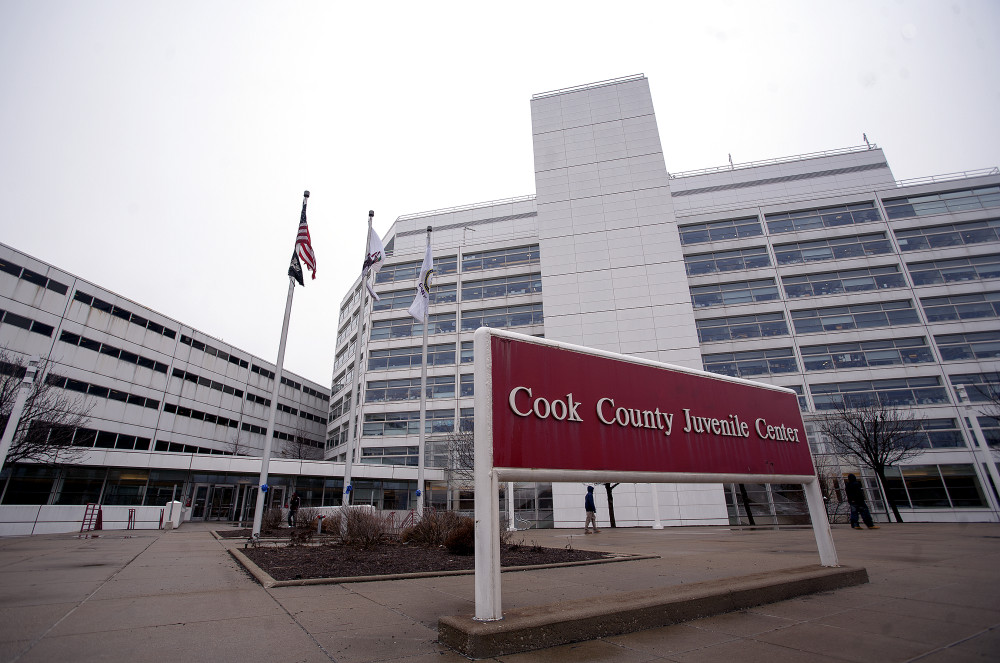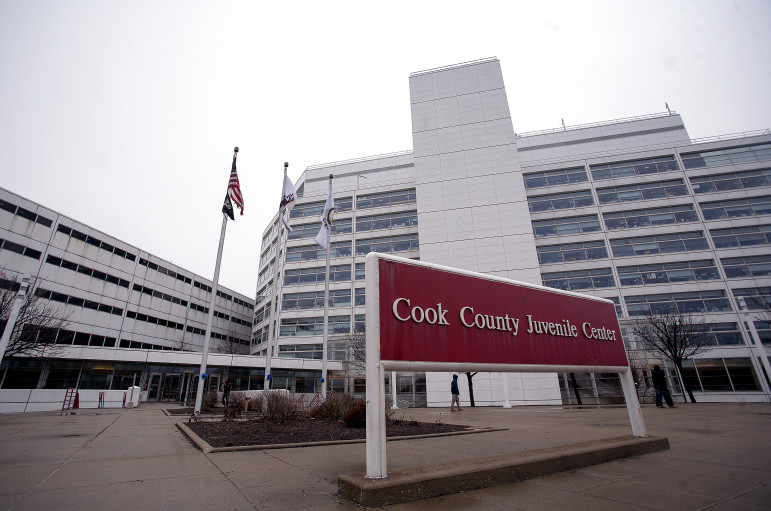
Photo by Erik Unger / JJIE
Cook County, Illinois, reports significant progress but continuing challenges
CHICAGO -- A century after Cook County, Illinois launched the world’s very first separate court system for juveniles accused of delinquency, Northwestern University scholar Linda Teplin initiated a groundbreaking study to examine the mental health status of young people confined in the county’s juvenile lock-up.
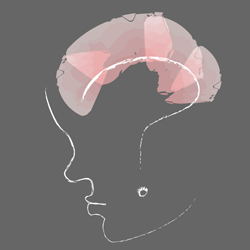 The results were alarming: Among a random sample of 1,829 young people taken into custody in Cook County from 1995 to 1998, 66 percent of boys and 74 percent of girls were diagnosed with at least one mental health disorder, and most of these youth had two or more disorders. Half had a clinically significant substance abuse problem. Depression, anxiety, and attention deficit disorder were all widespread.
The results were alarming: Among a random sample of 1,829 young people taken into custody in Cook County from 1995 to 1998, 66 percent of boys and 74 percent of girls were diagnosed with at least one mental health disorder, and most of these youth had two or more disorders. Half had a clinically significant substance abuse problem. Depression, anxiety, and attention deficit disorder were all widespread.
Yet Cook County’s mental health services for detained youth were paltry. Just 15 percent of youth tracked in the study received any mental health services inside the detention center, and just 8 percent received any mental health services in the community within six months of release from detention.
Teplin’s study, the largest of its kind ever undertaken, provided a wake-up call to leaders not just in Cook County but nationwide – part of a sea change in the juvenile justice field over the past decade toward growing awareness and action to address the mental health needs of court-involved youth.
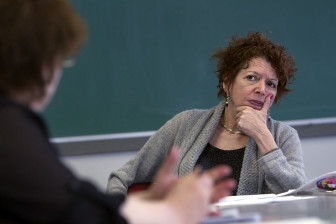
Erik Unger / The Chicago Bureau
Linda Teplin of Northwestern University launched a groundbreaking study examining the mental health status of young people confined in Cook County’s juvenile lock-up.
“We’ve come into this, since her studies, with a much more sophisticated understanding of the needs of the kids,” says Benjamin Wolf, associate legal director at the American Civil Liberties Union in Chicago. “You are dealing with large numbers of kids with fairly substantial mental health needs.”
In the decade since Teplin’s results were first reported, Cook County has taken significant strides on mental health care for delinquent teens, and Illinois has begun to as well. But a close look at both efforts shows that progress has been uneven, and important gaps remain.
Easing Chaos and Building Services in Cook County
In 1999, the ACLU filed a lawsuit over dangerous and chaotic conditions in the Cook County Juvenile Temporary Detention Center (JTDC). Problems included overcrowding, fights among youth and lack of staff training. In addition, Wolf says, “There were virtually no mental health services. It was a dangerously inadequate place for many, many years.”
One problem, overcrowding, was already on the wane. As a pilot site in the Annie E. Casey Foundation’s Juvenile Detention Alternatives Initiative, Cook County created a range of community-based alternatives to detention and reduced the average population locked in its 498-bed detention facility from more than 700 youth in the mid-1990s to 543 in 1999. With crime rates continuing to decline, the population has kept falling ever since, averaging 287 youth per day in 2011.
In 2003, Cook County created a Juvenile Court Clinic to better serve youth with mental health needs. Until then, many youth languished in detention awaiting mental health assessments or placements to appropriate treatment programs. Formed through a partnership between the chief judge’s office and Northwestern University, this court clinic streamlines the process to assess youths’ mental health needs. The clinic assigns a “case coordinator” with expertise in mental health to each juvenile courtroom to screen requests for clinical information, interpret results and identify appropriate mental health providers.
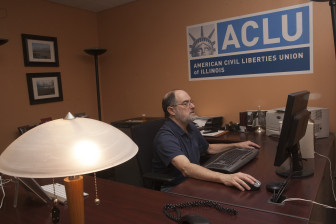
Erik Unger / JJIE
Benjamin Wolf, associate legal director at the American Civil Liberties Union in Chicago.
“The timeliness and the erratic quality of the information and lack of consistent and effective communication between the court and clinicians was a big problem,” says Barbara Conn, clinic director. “Those [problems] have been eradicated as a result of the implementation of this model.”
George Timberlake, chair of the Illinois Juvenile Justice Commission, has high praise for the clinic. “Having a dedicated mental health clinic inside the court system is fantastic,” he says. “In many ways, they’re a model for the country.” (Editor's note: Judge Timberlake is an occasional contributor to JJIE.)
Transitional Administrator, High Need Focus
The Court Clinic, however, did not solve all of the problems facing mentally ill youth in Cook County’s detention center. In 2007, the chief judge of the Cook County Circuit Court appointed a transitional administrator, Earl Dunlap, to overhaul the facility.
Under Dunlap, the detention center has improved on a number of fronts. The drawdown in population has enabled staff to focus more heavily on those with the greatest needs, which, in turn, has helped to reduce the incidence of violence. Dunlap has raised hiring standards at the detention center and fired about 100 workers, many of them patronage employees.
Since 2007, the county has contracted with the Isaac Ray Center, a private care agency, to institute a comprehensive behavioral health program in the detention center. “When we first got here … [mental health services were] run by the county, and they were woefully under-serviced,” with about five psychologists for the entire facility and only part-time psychiatrists, says Ted Garlewski, Isaac Ray’s director of mental health services at the JTDC. “We came in with a contract to provide the whole package.”
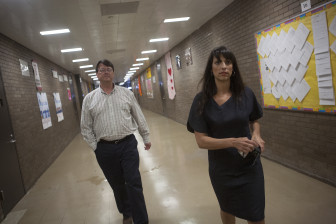
Erik Unger / JJIE
In 2007, Cook County contracted with the Isaac ray Center, a private care agency, to institute a comprehensive mental health program at the Cook County Juvenile Temporary Detention Center. Ted Garlewski (left, shown with Teresa Abreau, right) is director of the program.
Staff conduct mental health screens as soon as youth arrive, counselors are available for one-on-one sessions and psychiatrists prescribe medications as needed. Regular case reviews are performed, Garlewski says, and “if a kid is not supposed to be in confinement, we have the authority to take that kid out.”
Seven smaller living units have been created inside the detention center to house youth with the most acute mental health problems. Each has 45 beds and is staffed by four mental health professionals: a full-time psychologist, a master’s level mental health specialist, a clinical social worker, and either an advanced practice registered nurse or an adolescent psychiatrist.
Despite these improved mental health services, however, the physical conditions of the detention center remain problematic.
“I’ve been very impressed with the quality of many of the staff I’ve come across at the detention center,” says Betsy Clarke, president of the Juvenile Justice Initiative. “That said, the detention center itself, physically, is a horrible place. It has very little light; it’s very dark and prison-like. … There isn’t any green space. The physical design of the facility is just not conducive to behavioral health.”
Building a Bridge
Through the detention center’s “Bridge Program,” Cook County is also doing more to connect youth to mental health services in the community after release from detention, or while in a detention alternative program.
“This is innovative in the world of detention,” Garlewski says, adding that the probation department has been a key partner in that effort. “If a kid says he’s taking medication, but the probation officer sees a full bottle, or he hasn’t refilled that prescription, we know that’s not true. They’re our eyes and ears.”
The juvenile court clinic is also partnering more with probation. In the past, “The relationship was at best arms-length,” Conn says. “If a judge is concerned that a kid in the detention center might need medication or a psych evaluation, our clinical coordinators facilitate that happening.”
The probation department has also strengthened its mental health programming. The probation department used to routinely place mentally ill youth into psychiatric treatment facilities, says Michael Rohan, director of probation court services. It housed an average of 425 youth per day in those facilities in 1996, he says. “Today we have just three.”
Since 2002, the probation department has been funding a rigorous at-home treatment model, Multisystemic Therapy, which has proved effective in numerous clinical evaluation studies. Thus far, 971 youth with serious mental health needs have been served in Cook County’s MST program, many of whom would otherwise have been committed to a state correctional institution.
In addition, the department has begun offering a second evidence-based at-home treatment model, Functional Family Therapy. The treatment is provided by a team of 20 officers with counseling advanced degrees, specially trained the FFT model. Each officer treats up to six youth at a time who suffer with depression, anxiety and other mental health conditions, including many who have been traumatized and exposed to violence, “which unfortunately is a good portion of our kids,” Rohan says.
Together, the department serves about 200 youth in these two model treatment programs on any given day – 60 in MST, and roughly 140 in FFT – out of its total probation population of 4,500. Rohan concedes that the programs still serve a small sliver of Cook County’s probation caseload, but getting the programs funded even at current levels “has been a victory for us,” he says.
“The idea of trying to connect kids back to services in their community, as they need them, either as a function of a probation sentence or as a service from the detention center, that’s rare,” says Timberlake. “But it’s not nonexistent, and Cook [County] does a better job of that than anybody else. The rest of the state is doing a variable job.”
This series is part of an ongoing collaboration with the Center for Public Integrity.
